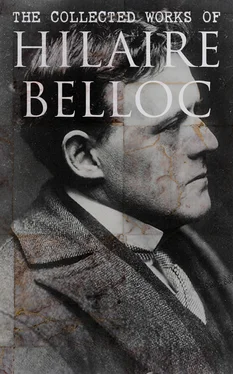Now the straight line to Rome ran from where I stood, right across that plain of Belfort, right across the ridges of the Jura, and cut the plain of the Aar a few miles to the west of a town called Solothurn or Soleure, which stands upon that river.
It was impossible to follow that line exactly, but one could average it closely enough by following the high road down the mountain through Belfort to a Swiss town called Porrentruy or Portrut--so far one was a little to the west of the direct line.
From Portrut, by picking one's way through forests, up steep banks, over open downs, along mule paths, and so forth, one could cross the first ridge called the 'Terrible Hill', and so reach the profound gorge of the river Doubs, and a town called St Ursanne. From St Ursanne, by following a mountain road and then climbing some rocks and tracking through a wood, one could get straight over the second ridge to Glovelier. From Glovelier a highroad took one through a gap to Undervelier and on to a town called Moutier or Munster. Then from Munster, the road, still following more or less the line to Rome but now somewhat to the east of it, went on southward till an abrupt turn in it forced one to leave it. Then there was another rough climb by a difficult path up over the last ridge, called the Weissenstein, and from its high edge and summit it was but a straight fall of a mile or two on to Soleure.
So much my map told me, and this mixture of roads and paths and rock climbs that I had planned out, I exactly followed, so as to march on as directly as possible towards Rome, which was my goal. For if I had not so planned it, but had followed the highroads, I should have been compelled to zig-zag enormously for days, since these ridges of the Jura are but little broken, and the roads do not rise above the crests, but follow the parallel valleys, taking advantage only here and there of the rare gaps to pass from one to another.
Here is a sketch of the way I went, where my track is a white line, and the round spots in it are the towns and villages whose names are written at the side. In this sketch the plains and low valleys are marked dark, and the crests of the mountains left white. The shading is lighter according to the height, and the contour lines (which are very far from accurate) represent, I suppose, about a thousand feet between each, or perhaps a little more; and as for the distance, from the Ballon d'Alsace to Soleure might be two long days' march on a flat road, but over mountains and up rocks it was all but three, and even that was very good going. My first stage was across the plain of Belfort, and I had determined to sleep that night in Switzerland.
I wandered down the mountain. A little secret path, one of many, saved me the long windings of the road. It followed down the central hollow of the great cleft and accompanied the stream. All the way for miles the water tumbled in fall after fall over a hundred steps of rock, and its noise mixed with the freshness of the air, and its splashing weighted the overhanging branches of the trees. A little rain that fell from time to time through the clear morning seemed like a sister to the spray of the waterfalls; and what with all this moisture and greenery, and the surrounding silence, all the valley was inspired with content. It was a repose to descend through its leaves and grasses, and find the lovely pastures at the foot of the descent, a narrow floor between the hills. Here there were the first houses of men; and, from one, smoke was already going up thinly into the morning. The air was very pure and cold; it was made more nourishing and human by the presence and noise of the waters, by the shining wet grasses and the beaded leaves all through that umbrageous valley. The shreds of clouds which, high above the calm, ran swiftly in the upper air, fed it also with soft rains from time to time as fine as dew; and through those clear and momentary showers one could see the sunlight.
When I had enjoyed the descent through this place for but a few miles, everything changed. The road in front ran straight and bordered--it led out and onwards over a great flat, set here and there with hillocks. The Vosges ended abruptly. Houses came more thickly, and by the ceaseless culture of the fields, by the flat slate roofs, the white-washed walls, and the voices, and the glare, I knew myself to be once more in France of the plains; and the first town I came to was Giromagny.
Here, as I heard a bell, I thought I would go up and hear Mass; and I did so, but my attention at the holy office was distracted by the enormous number of priests that I found in the church, and I have wondered painfully ever since how so many came to be in a little place like Giromagny. There were three priests at the high altar, and nearly one for each chapel, and there was such a buzz of Masses going on, beginning and ending, that I am sure I need not have gone without my breakfast in my hurry to get one. With all this there were few people at Mass so early; nothing but these priests going in and out, and continual little bells. I am still wondering. Giromagny is no place for relics or for a pilgrimage, it cures no one, and has nothing of a holy look about it, and all these priests--
LECTOR. Pray dwell less on your religion, and--
AUCTOR. Pray take books as you find them, and treat travel as travel. For you, when you go to a foreign country, see nothing but what you expect to see. But I am astonished at a thousand accidents, and always find things twenty-fold as great as I supposed they would be, and far more curious; the whole covered by a strange light of adventure. And that is the peculiar value of this book. Now, if you can explain these priests---
LECTOR. I can. It was the season of the year, and they were swarming.
AUCTOR. So be it. Then if you will hear nothing of what interests me, I see no reason for setting down with minute care what interests you, and I may leave out all mention of the Girl who could only speak German, of the Arrest of the Criminal, and even of the House of Marshal Turenne--- this last something quite exceptionally entertaining. But do not let us continue thus, nor push things to an open quarrel. You must imagine for yourself about six miles of road, and then--then in the increasing heat, the dust rising in spite of the morning rain, and the road most wearisome, I heard again the sound of bugles and the sombre excitement of the drums.
It is a thought-provoking thing, this passing from one great garrison to another all the way down the frontier. I had started from the busy order of Toul; I had passed through the silence and peace of all that Moselle country, the valley like a long garden, and I had come to the guns and the tramp of Épinal. I had left Épinal and counted the miles and miles of silence in the forests, I had crossed the great hills and come down into quite another plain draining to another sea, and I heard again all the clamour that goes with soldiery, and looking backward then over my four days, one felt--one almost saw--the new system of fortification, the vast entrenched camps each holding an army, the ungarnished gaps between.
As I came nearer to Belfort, I saw the guns going at a trot down a side road, and, a little later, I saw marching on my right, a long way off, the irregular column, the dust and the invincible gaiety of the French line. The sun here and there glinted on the ends of rifle-barrels and the polished pouches. Their heavy pack made their tramp loud and thudding. They were singing a song.
I had already passed the outer forts; I had noted a work close to the road; I had gone on a mile or so and had entered the long and ugly suburb where the tramway lines began, when, on one of the ramshackle houses of that burning, paved, and noisy endless street, I saw written up the words,
Wine; shut or open.
As it is a great rule to examine every new thing, and to suck honey out of every flower, I did not--as some would--think the phrase odd and pass on. I stood stock-still gazing at the house and imagining a hundred explanations. I had never in my life heard wine divided into shut and open wine. I determined to acquire yet one more great experience, and going in I found a great number of tin cans, such as the French carry up water in, without covers, tapering to the top, and standing about three feet high; on these were pasted large printed labels, '30', '40', and '50', and they were brimming with wine. I spoke to the woman, and pointing at the tin cans, said--
Читать дальше












